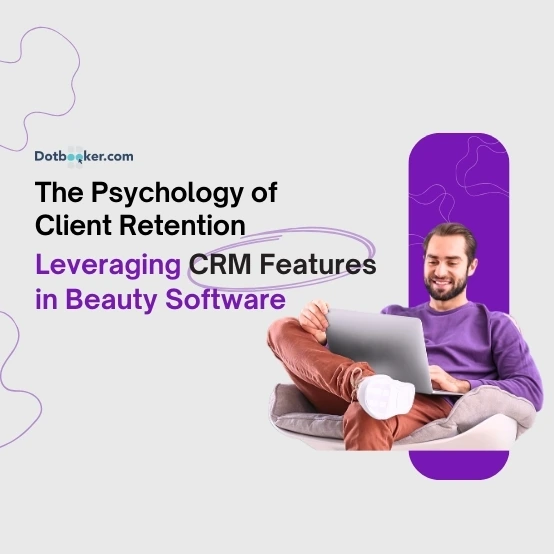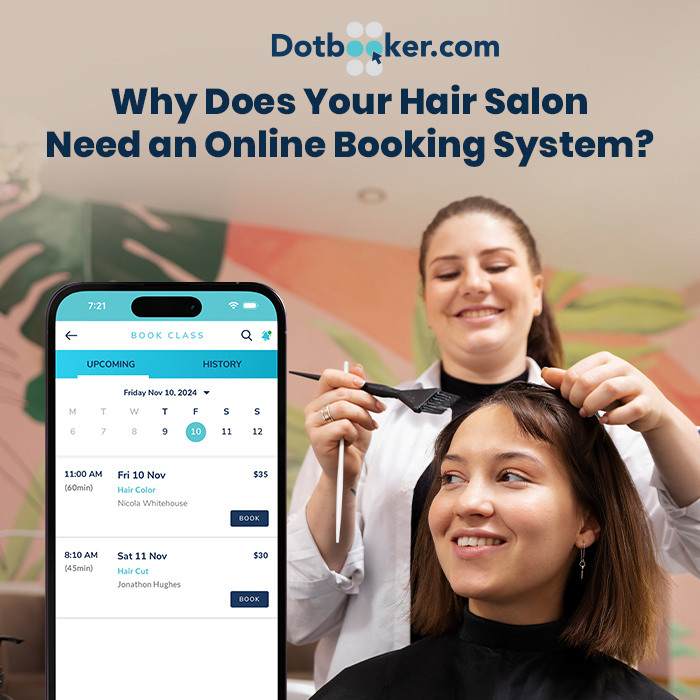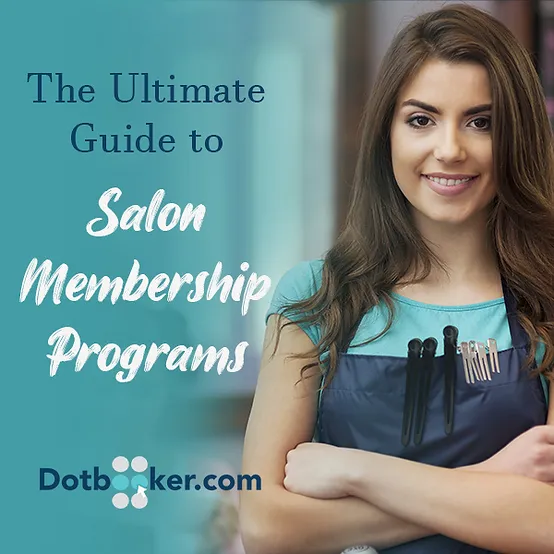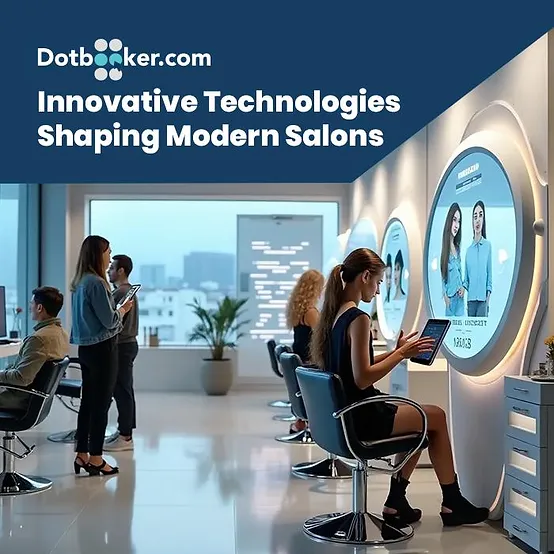
- By Dotbooker
- Jan 17, 2025
- 389
The Psychology of Client Retention: Leveraging CRM Features in Beauty Software
In the dynamic world of beauty and wellness, attracting new clients is only half the battle. The true art lies in keeping them engaged, satisfied, and loyal over time.
Enter the realm of Customer Relationship Management (CRM) features in modern beauty software—a tool not just for operations but a key to unlocking the psychology of client retention.
In this blog, we’ll explore how leveraging CRM features can foster enduring client relationships and drive revenue growth for your business.
Understanding Client Retention Through Psychology
The foundation of client retention lies in understanding human behavior. In the beauty and wellness industry, clients often seek more than a service; they seek an experience that resonates with their needs and emotions. Psychology tells us that clients are more likely to stay loyal when:
- They feel valued: Recognition and appreciation trigger positive emotions, reinforcing their connection to your brand. Whether it’s a simple thank-you note or a personalized service recommendation, making clients feel seen and acknowledged goes a long way.
- Their preferences are understood: Personalized experiences create a sense of exclusivity, making clients feel special. For instance, remembering a client’s favorite product or preferred stylist shows attention to detail that builds trust.
- Their trust is earned: Consistency and transparency foster trust, a cornerstone of long-term relationships. Delivering high-quality services reliably ensures that clients associate your business with excellence.
- They perceive added value: Clients are likelier to stay loyal when they see additional benefits from your services. This could be loyalty rewards, exclusive offers, or educational content about beauty and wellness trends.
How CRM Features Enhance Client Retention?
Modern beauty software, often regarded as the best beauty salon booking system, integrates CRM features that align with these psychological principles. Here’s how these tools make a difference:
Lead Management
Lead management in CRM helps businesses track and nurture potential customers from the moment they show interest until they decide to make a purchase.
It functions like a detailed tracking system, capturing every interaction—whether it’s a website visit, a conversation over the phone, or responses to marketing materials. By analyzing this data, businesses can better understand what each lead needs and tailor their sales strategies accordingly.
This feature allows for segmentation of leads based on their behavior and preferences, enabling targeted follow-ups. Additionally, scoring mechanisms rank leads based on their likelihood to convert, helping sales teams prioritize their efforts to maximize efficiency and effectiveness.
Example: A real estate agency uses its CRM to track potential buyers. When a visitor on their website fills out a form showing interest in a property, the CRM automatically tags them as a "hot lead" if they've visited multiple listings and schedules a follow-up call. The system notifies the agent when it's time to reach out, ensuring timely contact.
Client Management
Client management in a CRM system provides a centralized database that stores comprehensive information about customers and prospects. This includes basic contact details, communication history, transaction records, and personal notes from previous interactions.
By having all this information in one place, businesses can provide a personalized and consistent experience across different teams. This feature also supports segmentation, allowing marketing teams to tailor campaigns to specific groups based on collected data.
Over time, this ongoing accumulation of data enriches each profile, which enhances the ability to cross-sell and upsell based on the customer’s history and preferences.
Example: A boutique clothing store maintains a contact management system where they record each customer's purchase history and preferences. When a customer buys a summer dress, the CRM notes the style and size. This information is used to alert the customer via email when new accessories that match their past purchases arrive in store.
Workflow Automation
Workflow automation within CRM systems streamlines business processes by eliminating repetitive tasks and automating them based on predefined rules.
For example, when a new lead is entered, the CRM can automatically assign it to the appropriate salesperson based on the lead’s location or interest. It can also set reminders for follow-ups or trigger emails to be sent at specific stages of the customer journey.
This automation ensures that no task is forgotten and that all processes are completed in a timely and efficient manner. It significantly reduces the chance of human error, increases productivity, and allows staff to focus on higher-value interactions.
Email Automation
Email automation in CRM systems is designed to engage customers with the right message at the right time, based on their interactions with your business. This feature uses triggers, such as a customer’s purchase history or recent website activity, to send personalized emails.
For instance, if a customer views a product but doesn’t purchase it, the CRM can send them a tailored email with more information or a discount code to encourage a purchase.
Moreover, the system can prevent sending redundant emails if it detects that the action required has already been completed by the customer. This thoughtful approach to communication helps maintain a positive relationship, keeps your brand top of mind, and drives customer engagement without being intrusive.
Online Booking Convenience
A seamless booking experience is a cornerstone of the beauty and wellness management process. CRMs integrated into beauty software allow clients to easily book, reschedule, or cancel appointments, significantly enhancing their overall experience. This convenience not only reduces friction but also helps minimize no-shows.
Dotbooker takes this a step further by offering a powerful, user-friendly platform that simplifies the booking process for clients and salon staff.
With Dotbooker, clients can access real-time availability and quickly secure appointments for individual services or bundled packages. Additionally, Dotbooker can suggest relevant service upgrades based on client preferences, boosting revenue potential while providing an even more personalized experience.
By automating the booking and rescheduling processes, Dotbooker also frees up valuable staff time, allowing them to focus on delivering exceptional customer service, further improving client satisfaction and loyalty.
Beyond Technology: Building Emotional Connections
While technology plays a significant role in client retention, the human touch remains irreplaceable. Beauty businesses can complement CRM features with strategies such as:
- Staff Training: Ensuring your team understands the importance of personalization and empathy during client interactions.
- Community Engagement: Hosting events, workshops, or social media campaigns to create a sense of community around your brand.
- Consistent Branding: Maintaining a cohesive brand image across all client touchpoints, from in-salon decor to digital communications.
Real-World Success: How Beauty Businesses Are Thriving
Consider a salon that enhanced their operations by integrating their existing CRM system with Dotbooker, a comprehensive beauty software. This integration allowed them to leverage detailed client profiles for sending personalized birthday greetings with discounts, leading to a 20% increase in repeat bookings during promotional periods. Additionally, automated reminders facilitated through the CRM integration reduced no-show rates by 30%, directly boosting revenue.
Similarly, a spa utilized their CRM's capabilities in conjunction with Dotbooker to implement a loyalty program where clients earned points for every service. This synergy led to a 40% increase in customer retention over a year. These examples highlight how effective CRM integration with Dotbooker can streamline operations and significantly enhance client loyalty and retention.
Moreover, businesses that engage clients through feedback and exclusive events, managed through their integrated systems, have reported higher satisfaction rates and increased word-of-mouth referrals, showcasing the compound benefits of strategic retention strategies.
Key Statistics Supporting CRM’s Impact
- Businesses using CRM tools see an average retention rate increase of 27%.
- Loyal clients are 50% more likely to try new services and spend 31% more than new clients.
- Automated appointment reminders reduce no-show rates by up to 39%.
- Personalized marketing campaigns yield an average ROI of 38% higher than generic promotions.
Final Thoughts
In the competitive beauty and wellness industry, retaining clients is as important as attracting them. The psychology of client retention highlights the significance of personalized experiences, consistent communication, and trust—all of which can be effectively managed through CRM features in beauty software.
Whether managing a small boutique salon or a large spa chain, investing in the Dotbooker as the best beauty salon booking system can transform your client relationships and set your business on a path to sustained growth. Understanding your client’s needs and leveraging technology can turn one-time visitors into loyal patrons who champion your brand.
Embrace the power of CRM and watch your beauty business flourish—because client retention is not just a strategy; it’s an art grounded in understanding and connection.
Popular Blogs

- Oct 20, 2022
- 3007

- Sep 08, 2024
- 1902

- Nov 11, 2022
- 1424

- Sep 16, 2024
- 1249
Transform your business now!

Get an expert consultation for your business's streamlined operations.